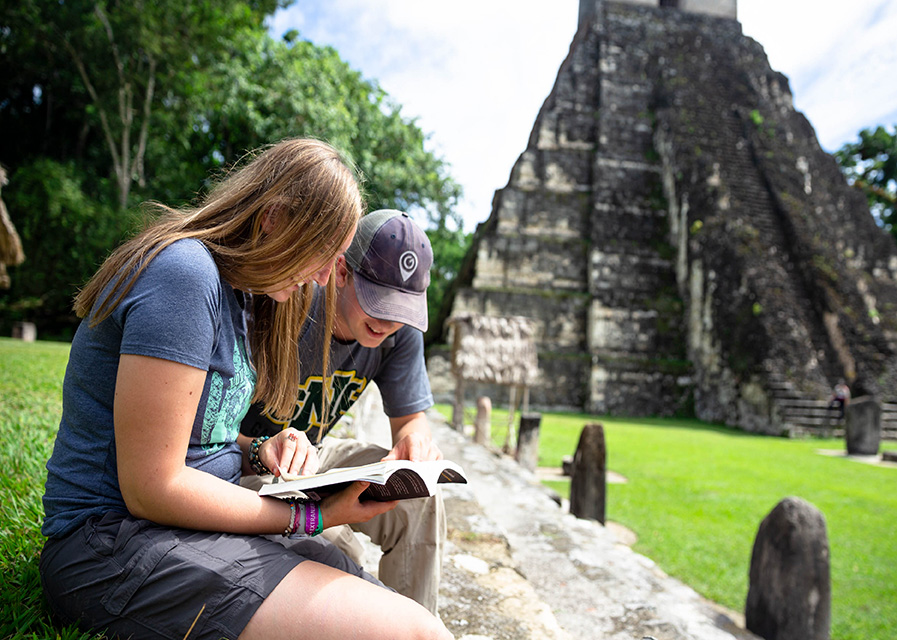

Teaching and living in another country rich with differences and history enhances the education and total development of the student-teacher. St. Norbert College’s Global Student-Teaching Program allows teacher-education students the opportunity to enjoy two diverse student-teaching placements — one within the United States and one abroad.
Enjoying a second student-teaching placement in another country is an extraordinary professional and personal experience for the future teacher. This teaching opportunity requires rigorous preparation on the part of the student-teacher in the form of research and application. The student who plans to teach abroad must see themselves as an ambassador and St. Norbert College representative to their host country.
Apply for global student-teaching by completing the standard student-teaching application. Pay special attention to the sections regarding global student-teaching. There is a nonrefundable application fee for global student-teaching due at the time the student-teaching application is submitted. Applications for global student-teaching are reviewed as part of the student-teaching approval process. Student-teaching applications are reviewed and approved by the teacher-education faculty. Pre-service teachers are notified of the acceptance or nonacceptance for placement by letter. Due to the limited number of placements, student-teaching placements abroad are not guaranteed. Students applying to student-teach abroad will need to have demonstrated success in their first student-teaching placement. For information on student-teaching requirements and the application process, visit the student-teaching website.
Students planning on student-teaching abroad may find it helpful to create a budget to estimate their travel costs. Students are encouraged to seek advice from students who have recently returned from a student-teaching experience abroad from the director of global student-teaching. The cost of your global student-teaching experience will depend largely upon your placement location. You may also consult a travel agency in order to get a better sense of the cost of living abroad. There are many websites and books that can be helpful in estimating costs or finding student rates on air travel, passports, admission, vaccination, health and safety.
Global student-teachers are required to attend all sessions of the Global Student-Teaching Seminar. This seminar takes place in fall during the year in which student-teaching abroad occurs. The purpose of the seminar is to prepare the student-teacher for a successful student-teaching experience abroad. Seminar topics cover a variety of issues including orientation, health, safety, travel, cultural development, communication with host school/country, culture, language, geography, weather and more.
Bola Delano-Oriaran, Director of Global Student-Teaching
920-403-3229
bola.delano-oriaran@snc.edu


Education students have the opportunity to student-teach in the following countries:
Once you have been accepted to the Global Student-Teaching Program, follow these steps:
A student-teacher usually lives in housing that has been selected by the host school abroad. Room and board ranges from $170-$500 U.S. currency per week, depending on the country. The director of global student-teaching will facilitate housing accommodations for student-teachers abroad. Students who currently stay in on-campus housing should contact Residential Education and Housing (REH) and notify them of any absences away from campus.
Travel arrangements are the responsibility of the student-teacher. Begin your travel arrangements early. You are urged to secure the services of a reputable travel agent who has experience with global travel and is especially skilled in exploring student rates. Traveling abroad requires that you have a passport and/or visa. Vaccination may also be required for some countries.
Before you tour a country, check and see if you can get student discounts on transportation, lodging and meals.
Students-teachers abroad are required to be in communication with the director of global student-teaching through letters, emails, blogging, iChat or Skype. Letters and emails serve as a dialogue between the student-teacher and the director, and are a method of recording experiences and posing important questions during the student-teaching abroad assignment.
Photos are another excellent way to record your experience and share it with others. Always get the approval of students and their families when taking pictures. Students should also stay in contact with parents, friends and professors.
If your family members plan to visit you during your teaching assignment, kindly arrange to have them visit you near the end of your teaching experience. Before they visit, send your parents photos of your host family, community and classroom to prepare them. In addition to introducing your parents to your host family, make sure they meet significant people at your school and in the community. Family visits must not interfere with student-teaching obligations.
A student planning to teach abroad must investigate to make certain that the family insurance policy liability coverage covers the country in which the student will be teaching. A person teaching abroad must be protected by a personal injury and property damage liability policy.
The student-teacher should make certain that his or her medical insurance provides coverage for adequate health and accident insurance. Copies of liability and medical insurance must be filed in the teacher-education office along with the student-teaching application. Immunization against certain diseases is a good idea and may be required before entering some countries.
To be safe, make at least three copies of your important documents, such as passport, social security card and insurance information. Leave one copy with your parents or the director of global student-teaching. Keep another copy somewhere safe, such as your host family’s house. Carry the third set. Always carry your important information: emergency phone numbers, the addresses and phone numbers of your host family and country’s contact in your wallet. This is particularly important when arriving in your country so that in the event you lose your luggage, you still have access to the information.
Follow our global student-teachers on their adventures in classrooms around the world.

Campus location
Ariens Family Welcome Center
310 College Ave.
De Pere, WI 54115
Hours of operation
Monday-Friday
8 a.m.-4:30 p.m.
We’re also available by appointment.
Mailing address
Office of Admission
St. Norbert College
Ariens Family Welcome Center
100 Grant St.
De Pere, WI 54115